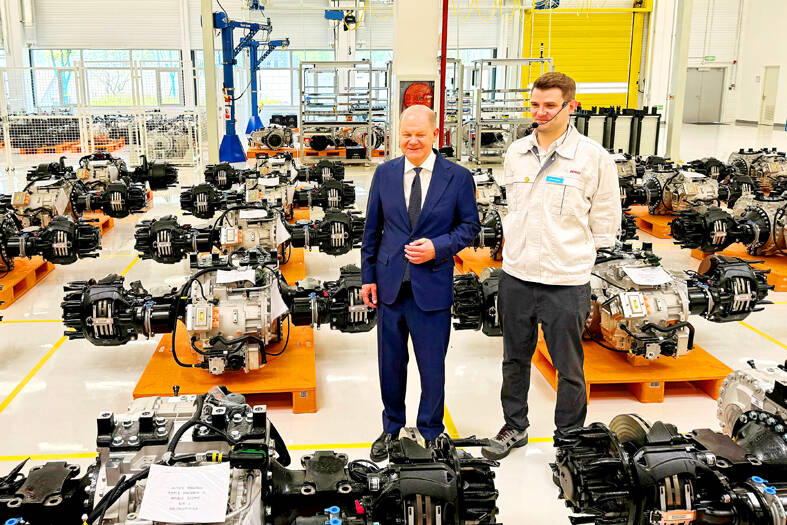German Chancellor Olaf Scholz yesterday warned Iran against further attacks on Israel as the escalating conflict in the Middle East overshadowed the start of his three-day tour of China.
Scholz is visiting the southwestern town of Chongqing, as well as Shanghai and Beijing, as part of a visit to shore up ties with Germany’s top trade partner while addressing growing rifts over issues including Chinese trade practices and its support for Russia.
However, Iran’s attack on Israel looks set to redefine the agenda and tone of the visit.

Photo: Reuters
For example, Scholz was yesterday to participate from his hotel in a video meeting of G7 leaders to discuss Iran’s attack, a German delegation source said.
“We will do everything to stop a further escalation,” Scholz told reporters. “We can only warn everyone, especially Iran, against continuing this way.”
German officials had also expressed hope before the trip that Beijing could play a positive role in cooling the growing tensions in the Middle East, despite their critical assessment of its support for Russia in its invasion of Ukraine.
Scholz, who is traveling with several German CEOs, is tomorrow to meet Chinese President Xi Jinping (習近平) and Chinese Premier Li Qiang (李強).
The chancellor earlier yesterday visited German auto supplier Robert Bosch GmbH’s hydrogen fuel cell plant in Chongqing, putting the spotlight on an area of rising tensions.
The EU is carrying out several probes into whether Chinese green tech exports such as battery electric vehicles have benefited from state subsidies, which could harm local producers.
Germany’s auto industry fears these probes could lead to a trade dispute that could damage their prospects in the world’s biggest auto market.
Scholz’s visit is being watched for signs of how much Germany backs the EU probe and is willing to go against the wishes of a key national industry.
Scholz yesterday said that the Bosch plant showed the importance of cooperation in tackling challenges such as climate change.
Berlin’s overall stance on China has become more critical since the war in Ukraine.
Last year, Germany also published its first China strategy, describing “unfair practices” and the risks to supply chains in a potential conflict over Taiwan, while urging “derisking.”

AT RISK: The council reiterated that people should seriously consider the necessity of visiting China, after Beijing passed 22 guidelines to punish ‘die-hard’ separatists The Mainland Affairs Council (MAC) has since Jan. 1 last year received 65 petitions regarding Taiwanese who were interrogated or detained in China, MAC Minister Chiu Chui-cheng (邱垂正) said yesterday. Fifty-two either went missing or had their personal freedoms restricted, with some put in criminal detention, while 13 were interrogated and temporarily detained, he said in a radio interview. On June 21 last year, China announced 22 guidelines to punish “die-hard Taiwanese independence separatists,” allowing Chinese courts to try people in absentia. The guidelines are uncivilized and inhumane, allowing Beijing to seize assets and issue the death penalty, with no regard for potential

STILL COMMITTED: The US opposes any forced change to the ‘status quo’ in the Strait, but also does not seek conflict, US Secretary of State Marco Rubio said US President Donald Trump’s administration released US$5.3 billion in previously frozen foreign aid, including US$870 million in security exemptions for programs in Taiwan, a list of exemptions reviewed by Reuters showed. Trump ordered a 90-day pause on foreign aid shortly after taking office on Jan. 20, halting funding for everything from programs that fight starvation and deadly diseases to providing shelters for millions of displaced people across the globe. US Secretary of State Marco Rubio, who has said that all foreign assistance must align with Trump’s “America First” priorities, issued waivers late last month on military aid to Israel and Egypt, the

‘UNITED FRONT’ FRONTS: Barring contact with Huaqiao and Jinan universities is needed to stop China targeting Taiwanese students, the education minister said Taiwan has blacklisted two Chinese universities from conducting academic exchange programs in the nation after reports that the institutes are arms of Beijing’s United Front Work Department, Minister of Education Cheng Ying-yao (鄭英耀) said in an exclusive interview with the Chinese-language Liberty Times (the Taipei Times’ sister paper) published yesterday. China’s Huaqiao University in Xiamen and Quanzhou, as well as Jinan University in Guangzhou, which have 600 and 1,500 Taiwanese on their rolls respectively, are under direct control of the Chinese government’s political warfare branch, Cheng said, citing reports by national security officials. A comprehensive ban on Taiwanese institutions collaborating or

France’s nuclear-powered aircraft carrier and accompanying warships were in the Philippines yesterday after holding combat drills with Philippine forces in the disputed South China Sea in a show of firepower that would likely antagonize China. The Charles de Gaulle on Friday docked at Subic Bay, a former US naval base northwest of Manila, for a break after more than two months of deployment in the Indo-Pacific region. The French carrier engaged with security allies for contingency readiness and to promote regional security, including with Philippine forces, navy ships and fighter jets. They held anti-submarine warfare drills and aerial combat training on Friday in